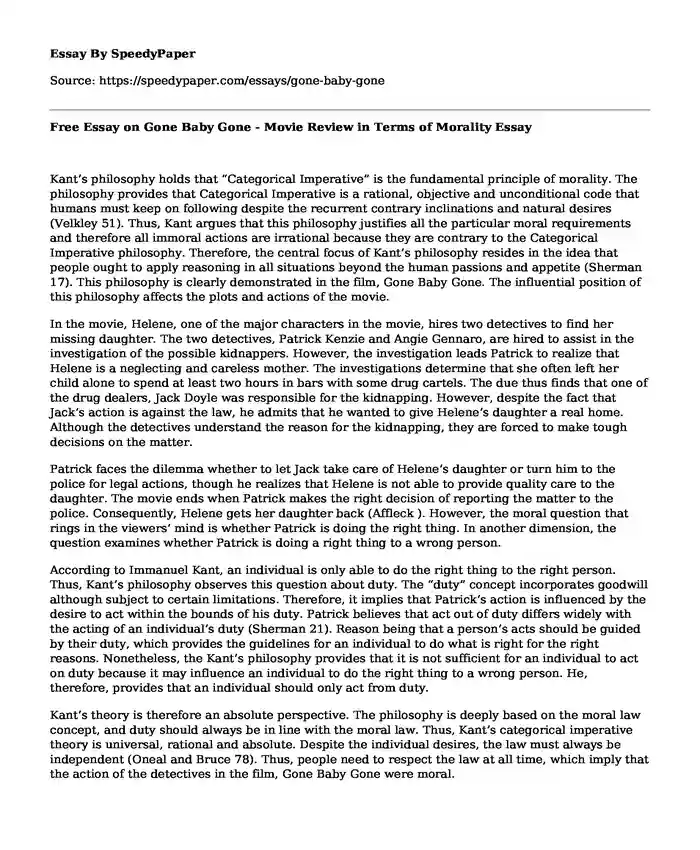
| Type of paper: | Essay |
| Categories: | Philosophy Ethics Movie Immanuel Kant |
| Pages: | 3 |
| Wordcount: | 696 words |
Kant’s philosophy holds that “Categorical Imperative” is the fundamental principle of morality. The philosophy provides that Categorical Imperative is a rational, objective and unconditional code that humans must keep on following despite the recurrent contrary inclinations and natural desires (Velkley 51). Thus, Kant argues that this philosophy justifies all the particular moral requirements and therefore all immoral actions are irrational because they are contrary to the Categorical Imperative philosophy. Therefore, the central focus of Kant’s philosophy resides in the idea that people ought to apply reasoning in all situations beyond the human passions and appetite (Sherman 17). This philosophy is clearly demonstrated in the film, Gone Baby Gone. The influential position of this philosophy affects the plots and actions of the movie.
In the movie, Helene, one of the major characters in the movie, hires two detectives to find her missing daughter. The two detectives, Patrick Kenzie and Angie Gennaro, are hired to assist in the investigation of the possible kidnappers. However, the investigation leads Patrick to realize that Helene is a neglecting and careless mother. The investigations determine that she often left her child alone to spend at least two hours in bars with some drug cartels. The due thus finds that one of the drug dealers, Jack Doyle was responsible for the kidnapping. However, despite the fact that Jack’s action is against the law, he admits that he wanted to give Helene’s daughter a real home. Although the detectives understand the reason for the kidnapping, they are forced to make tough decisions on the matter.
Patrick faces the dilemma whether to let Jack take care of Helene’s daughter or turn him to the police for legal actions, though he realizes that Helene is not able to provide quality care to the daughter. The movie ends when Patrick makes the right decision of reporting the matter to the police. Consequently, Helene gets her daughter back (Affleck ). However, the moral question that rings in the viewers’ mind is whether Patrick is doing the right thing. In another dimension, the question examines whether Patrick is doing a right thing to a wrong person.
According to Immanuel Kant, an individual is only able to do the right thing to the right person. Thus, Kant’s philosophy observes this question about duty. The “duty” concept incorporates goodwill although subject to certain limitations. Therefore, it implies that Patrick’s action is influenced by the desire to act within the bounds of his duty. Patrick believes that act out of duty differs widely with the acting of an individual’s duty (Sherman 21). Reason being that a person’s acts should be guided by their duty, which provides the guidelines for an individual to do what is right for the right reasons. Nonetheless, the Kant’s philosophy provides that it is not sufficient for an individual to act on duty because it may influence an individual to do the right thing to a wrong person. He, therefore, provides that an individual should only act from duty.
Kant’s theory is therefore an absolute perspective. The philosophy is deeply based on the moral law concept, and duty should always be in line with the moral law. Thus, Kant’s categorical imperative theory is universal, rational and absolute. Despite the individual desires, the law must always be independent (Oneal and Bruce 78). Thus, people need to respect the law at all time, which imply that the action of the detectives in the film, Gone Baby Gone were moral.
Works Cited
Affleck, Ben. “Gone Baby Gone." Dir. Ben Affleck, Perf. Ben Affleck, 2007.
Oneal, John R., and Bruce M. Russett. "The Kantian peace: The pacific benefits of democracy, interdependence, and international organizations, 1885–1992." Bruce M. Russett: Pioneer in the Scientific and Normative Study of War, Peace, and Policy. Springer International Publishing, 2015. 74-108.
Sherman, Nancy. "The place of emotions in Kantian morality." Kant on Emotion and Value. Palgrave Macmillan UK, 2014. 11-32.
Velkley, Richard L. Freedom and the End of Reason: On the Moral Foundation of Kant's Critical Philosophy. University of Chicago Press, 2014.
Cite this page
Free Essay on Gone Baby Gone - Movie Review in Terms of Morality. (2018, Jan 16). Retrieved from https://speedypaper.com/essays/gone-baby-gone
Request Removal
If you are the original author of this essay and no longer wish to have it published on the SpeedyPaper website, please click below to request its removal:
- The Mountain of Pilatus - Essay Example on Tourism
- A Literary Essay Sample: Conflict within Jing-Mei
- Essay Sample Comprising Health Policy Evaluation
- Metamorphosis which Gregor's Room Undergoes, Literary Essay Example
- Free Paper Sample: What Is the Effect of Internal Assets on Academic Success?
- Essay Sample on Customer Satisfaction: Bad Vs. Good
- Essay Sample on Attention and Exposure
Popular categories




